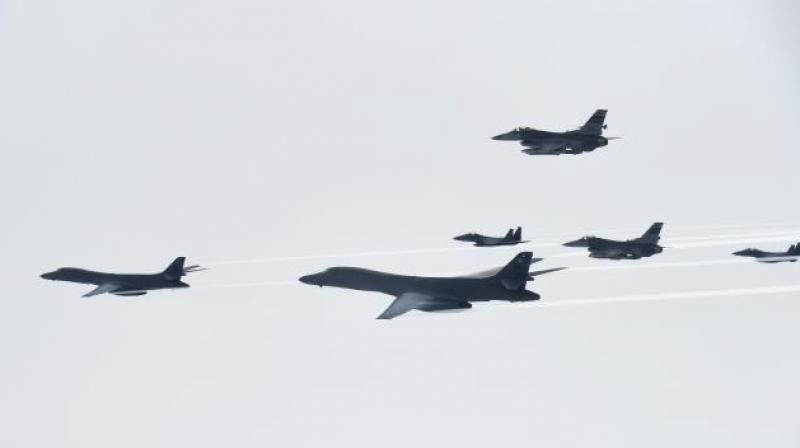US, S Korea kick off largest joint air drill, days after N Korea's missile test
Pyongyang over the weekend blasted the drill, accusing US President Donald's Trump's administration of begging for nuclear war.'

Seoul: The US and South Korea Monday kicked off their largest ever joint air exercise, an operation North Korea has labelled an "all-out provocation", days after Pyongyang fired its most powerful intercontinental ballistic missile.
The five-day Vigilant Ace drill - involving 230 aircraft, including F-22 Raptor stealth jet fighters, and tens of thousands of troops - began Monday morning, Seoul's air force said.
Pyongyang over the weekend blasted the drill, accusing US President Donald's Trump's administration of "begging for nuclear war".
The annual exercise comes five days after the nuclear- armed North test-fired a new ICBM, which it says brings the whole of the United States within range.
As tensions surged, US Senator Lindsey Graham, an influential Republican and foreign policy hawk, warned that the US was moving closer to "preemptive war" with the North.
Read: Preemptive war with North Korea more likely, warns US lawmaker
"If there's an underground nuclear test (by the North), then you need to get ready for a very serious response by the United States," Graham told the CBS show "Face the Nation".
The isolated and impoverished North has staged six increasingly powerful atomic tests since 2006 - most recently in September.
"The preemption is becoming more likely as their technology matures. Every missile test, every underground test of a nuclear weapon, means the marriage is more likely," he said.
Graham's remarks echoed those of Trump's National Security Adviser HR McMaster, who told a security forum on Saturday that the potential for war with the North "is increasing every day."
The North has boasted that the Hwasong 15 ICBM tested on Wednesday is capable of delivering a "super-large" nuclear warhead anywhere in the US mainland.
Analysts agree that the latest test showed a big improvement in potential range, but say it was likely achieved using a dummy warhead that would have been quite light.
They say a missile carrying a much heavier nuclear warhead would struggle to travel as far.
They are also sceptical that Pyongyang has mastered the sophisticated technology required to protect such a warhead from the extreme temperatures and stresses encountered as the missile hurtles back to Earth.
The North's widely-condemned nuclear and missile programmes have made significant progress under leader Kim Jong-Un, who has overseen four nuclear tests and dozens of missile launches since taking power in 2011.
The months-long nuclear standoff between Kim and Trump - as well as their trading of personal insults - has fuelled concerns of another conflict, more than six decades after 1950-53 Korean War that left much of the peninsula in ruins.
But even some Trump advisers say US military options are limited when Pyongyang could launch an artillery barrage on the South Korean capital Seoul - only around 50 kilometres from the heavily-fortified border and home to 10 million people.

